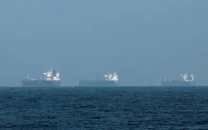Tactical acquittal
The most interesting aspect of his trial in England was its format

Altaf Hussain, the MQM chief, stands acquitted by a British court after a protracted trial. He has been absolved of charges of inciting violence and encouraging terrorism. He was booked following a speech he made via media in Karachi on August 22, 2016, which was interpreted by authorities in Pakistan to be inflammatory and an attempt to fan civil strife. Since then he has been a persona non grata as local courts outlawed his political role. The British jury, however, found Hussain not guilty on both the counts in a majority verdict of 10-2. It’s not sure what political impact this decision will have on the political landscape as the MQM chief has abdicated his role inside Pakistan. It will, nonetheless, go a long way in redefining the fine points of litigation under which the once all-powerful leader ended as a footnote in history.
The most interesting aspect of this trial in England was its format. The incendiary speech was in 2016, whereas the case was booked in 2019, as Scotland Yard launched an probe. Secondly, the indictment was split on two counts relating to the offence of encouraging terrorism, contrary to section 1(2) of the Terrorism Act 2006. This is where the steam was apparently lost, and he was released on bail after his initial arrest. Hussain pleaded not guilty on both the charges. He also stayed away from providing any evidence at trial to contradict his speeches. This smart move turned the hate speech charges political in essence, and the jury was on its own to interpret it. His acquittal was fait accompli.
Holding a citizen accountable by law in a foreign country is an upbeat challenge. WikiLeaks founder Julian Assange is a case in point. Hussain is a proclaimed fugitive since 2015 from the anti-terrorism courts in Pakistan on the charges of murder, targeted killings, treason, inciting violence and hate speeches. But the prosecution couldn’t carry the case under British law. This necessitates a legal valve, which should be analysed at the outset whether framing of charges will stand in a foreign court of law or not. No point in merely playing to the gallery.
Published in The Express Tribune, February 17th, 2022.
Like Opinion & Editorial on Facebook, follow @ETOpEd on Twitter to receive all updates on all our daily pieces.














COMMENTS
Comments are moderated and generally will be posted if they are on-topic and not abusive.
For more information, please see our Comments FAQ